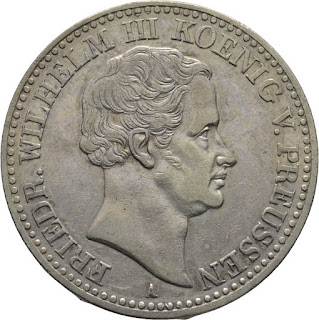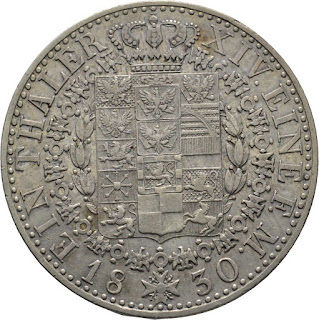German States Coins Prussia One Thaler or Dollar Silver Coin 1830 Friedrich Wilhelm III., König von Preußen
This Thaler was coined from 1823 to 1831.
Obverse: Bust of Frederick William III, King of Prussia., facing to the right.
Legend: "FRIEDR. WILHELM III. KOENIG VON PREUSSEN.", or in English, "Frederick William III, King of Prussia".
Exergue: Letter "A," Mint-mark of Berlin.
Reverse: Crowned shield, bearing arms of Prussia, encircled by a laurel wreath and the Collar of the Black Eagle.
Legend: "EIN THALER XIV EINE F. M." (One Thaler or Dollar, fourteen to weigh one Mark, fine silver).
Exergue: Date of the year of issue.
Weight: 343.72 grains. Fineness: 750.
Value: 1 Reichsthaler = 1/14 Cologne mark.
Metal: Silver (.750).
Weight: 22.272 g.
Diameter: 35 mm.
Shape: Round.
Frederick William III, King of Prussia
Frederick William III, (born August 3, 1770, Potsdam, Prussia [Germany] — died June 7, 1840, Berlin), king of Prussia from 1797, the son of Frederick William II. Neglected by his father, he never mastered his resultant inferiority complex, but the influence of his wife, Louisa of Mecklenburg-Strelitz, whom he married in 1793, occasionally moved him outside his essentially pedestrian character.
His policy of neutrality in the Wars of the Second and Third Coalitions accelerated the decline of Prussia’s prestige. Domestic reforms before the Battle of Jena foreshadowed later reforms without, however, altering the absolutist structure of the state. Until 1807 he clung to the traditional cabinet government, influenced by mediocre personages. After the military collapse of 1806–1807 and the loss of all provinces west of the Elbe River, he finally realized that Prussia would have to make decisive changes. He therefore sanctioned the reforms proposed by Prussian statesmen such as Karl Stein and Karl von Hardenberg, but these amounted only to a reform of the higher bureaucracy, not of the royal prerogative. The king never lost his fear that reform might lead to “Jacobinism,” and he could not tolerate outstanding men as advisers. Through the War of Liberation (1813–15) he remained remote from his people’s ardour, being always subservient to the Russian emperor Alexander I and in harmony with the Austrian statesman Klemens von Metternich. In the crisis of the Vienna Congress over the partition of Saxony, he sided with Alexander I, thus bringing Prussia to the brink of war against England, France, and Austria (January 1815). The final compromise allowed Prussia to acquire the Rhine province, Westphalia, and much of Saxony. In contrast to these territorial gains, the last 25 years of Frederick William’s reign show a downward trend of Prussia’s fortunes, to which his personal limitations largely contributed.

